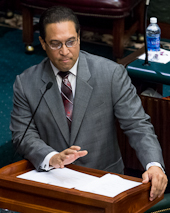Archive for June, 2013

Activists claim dump victory
 (CNS): Following a two and half year campaign to prevent government from relocating Grand Cayman’s landfill to Bodden Town on land owned by the Dart Group, local activists claimed victory Monday following the comments made by the minister for environmental health last week. Speaking at a press briefing, Osbourne Bodden, the district representative and new minister with responsibility for the landfill, confirmed that it was not moving. Celebrating the hard fought victory, the Coalition to Keep Bodden Town Dump Free said the victory showed that the people can stand up and fight to protect their interests against unpopular government decisions.
(CNS): Following a two and half year campaign to prevent government from relocating Grand Cayman’s landfill to Bodden Town on land owned by the Dart Group, local activists claimed victory Monday following the comments made by the minister for environmental health last week. Speaking at a press briefing, Osbourne Bodden, the district representative and new minister with responsibility for the landfill, confirmed that it was not moving. Celebrating the hard fought victory, the Coalition to Keep Bodden Town Dump Free said the victory showed that the people can stand up and fight to protect their interests against unpopular government decisions.
“In October 2010, when we launched the Coalition, we were told that this was a ‘done deal,” said Charles Clifford, Bodden’s former political colleague who was defeated at the polls in the district last month. “Many claimed that trying to fight government and Dart was hopeless. But we’ve proven that the people can organize and defeat senseless and unjust decisions … We’ve shown that we can stand up against questionable deals negotiated behind the people’s back and against their interests.”
Coalition leader and Midland Acres resident, Arlene Whittaker, commended Bodden for what she said was “having the backbone to stand up to Dart” and thanked the Coalition’s many supporters that helped them win the fight.
Gregg Anderson, who was also defeated at the recent national ballot, said the fictitious figures of $100 million in capital costs and $25 million in annual operating costs to deal with the dump on site was mere scaremongering.
“Local engineers and waste management entrepreneurs operating on Grand Cayman have outlined possible options to the Coalition which could eliminate Mount Trashmore in less than eight years, using small, modular, affordable air burners for waste-to-energy, like those currently used on Aruba, together with recycling, recuperation and resale of what’s valuable at the George Town dump,” he said.
“Structures for sorting and recycling are already in place, although still never used, and there’s neighbouring crown land for expansion. Estimated capital costs put forward are around $10 million – or as much as we continue to sink into the Turtle Farm every year – with some even claiming that a GT waste management facility could pay for itself,” Anderson added.
Coalition leaders are counting on the new government to explore all options openly and with public consultation. Clifford said government could identify the best affordable solution for the people of Grand Cayman by following due process and transparency.
Alan Beiner, the group's chair and the owner of the award winning Turtle Nest Inn, one of the islands’ most popular tourist spots outside of Seven Mile Beach, said moving the landfill and contaminating another site was never a real solution to the problem.

How money movement creates revenue for government
Let’s look at a day in the life of a single Cayman dollar bill. As our smallest valued paper currency it doesn’t seem like much but as you will see it packs quite a punch: Transaction 1 – It begins in the early morning when the dollar wakes up and goes to the coffee shop to be used in part of the purchase of a cup of juice and a newspaper. It goes into the cash register.
Transaction 2 – A coffee shop customer receives the dollar as change from her transaction. She then goes to the drugstore to fill her prescription. The dollar is used to pay part of her bill.
Transaction 3 – The next customer at the drugstore receives the dollar as change and takes it to the hardware store to buy some tools. The dollar is used to pay part of her bill.
Transaction 4 – The next customer at the hardware store receives the dollar as change and proceeds to go for a mid morning snack with her friends. She goes to a café and uses the dollar to buy a lemonade.
Transaction 5 – The next customer at the café receives the dollar as change and uses it to as part of her payment for groceries at the supermarket.
Transaction 6 -The next customer at the supermarket receives the dollar as change and uses it as part of a payment to purchase her son a pair of shoes after she picks him up from school.
Transaction 7- The next customer at the shoe store receives the dollar as change and goes to the drug store to buy some lipstick.
The dollar continues to move for the rest of the day from store to store. So how does this measly little dollar pack such a big punch? The secret lies not in its value but in how many times it moved throughout the day.
Each time this dollar entered a cash register to purchase dutiable goods it generated revenue for government. At normal retail mark up, about 10 cents of this dollar will be used to pay government duty in order to replace the goods which it purchased. (Remember, the retailer pays duty on the wholesale cost of goods not the retail value, which is why it is 10 cents and not 22 cents).
As you can see, if the dollar goes though 10 cash registers a day for the purchase of dutiable items, the revenue is 10 transactions times 10 cents per transaction or one dollar per day in government revenue via future duty. The next day this same dollar has the potential to do another 10 transactions and earn another dollar for government. So now this measly little dollar has the potential to generate 365 dollars per year for government just by constantly moving every day.
To be more precise, the movement is not the important part, it is the sudden stop at the cash register where it comes alive and does its work. When sitting idly in a purse or wallet it is just a piece of paper waiting to be used.
Each blue dollar bill is like a goose that lays golden eggs. Like the goose, it has to be properly nurtured and looked after. Constant attention must be paid to it and it must not be neglected or set aside. It performs a most valuable task in our daily lives and we need to take care to assure it is constantly used since it is by use that it gets its strength. Now let’s see what could hamper this process and put a damper on this revenue stream. The dollar's ability to perform such heroic feats every single day is dependent on several factors. This dollar is delicate and must be treated with care and respect.
So how do we kill or slow down such a productive little piece of paper? There are several ways. First is to put it in a piggy bank or a drawer and forget about it. It is now a prisoner and cannot be productive. It means that its brethren who are still free will have to work even harder to keep up the revenue stream to government. The more dollars that are hidden away for a rainy day means the remaining ones have to work many times harder to keep revenue production the same.
Another way is if the dollar is sent far way for spending elsewhere. It is the same as putting it in a drawer or under a mattress except it can’t be used in the future either since it has left forever.
So what makes people take these potentially valuable dollars and hold on to them like they are gold? High prices are the culprit. When goods become expensive to purchase due to inflation or taxes, people tend to spend less and hold on for dear life to the few dollars they have. Parting with them only takes place out of absolute necessity. Once again, fewer dollars circulate daily which means less revenue for government.
Government has bills to pay too so their only recourse in view of less dollars moving is to tax and take a larger portion of sales revenue through taxes to make up the shortfall. This of course causes even more dollars to go under the mattress and reduces their ability to buy the same amount of goods as before the taxes were levied. This in turn creates an even bigger deficit for government as this revenue stream dries up. Taxes are higher than ever but they are producing less revenue than when taxes were low due to the daily flow of the dollar being halted by their owners.
The good news is dollars never really die, they just go into hibernation. Once incentives are given to their owners in the form of lower prices and bigger bang for the buck from lower taxes, then the dollars come out of their deep sleep and go back to work producing many times their face value in revenue for government.
Moral of the story: Lower the cost of living by lowering taxes. Revenue streams will grow automatically. It is human nature and the hidden power of the almighty moving dollar.
Jobs are created by business when business grows. Business grows when there is increased demand for goods and services. Demand for goods and services increases when prices are lower and need exists. Lower prices come from lower government fees and taxes. Lower government fees and taxes increases consumer spending. Consumer spending therefore creates jobs. Consumer spending is controlled by government tax policy. Government does not create jobs. It may make temporary work for a few but its policies are what control job creation.
The unfortunate part is that when government finds itself in a financial bind as we are now, they fear that cutting taxes will reduce their needed revenue. Hopefully, what I have shown above is that it is exactly what the doctor ordered. Reducing taxes and lowering the cost of living will result in the badly needed revenue increases and jobs creation.

‘Austerity doesn’t work’
 (CNS): As a Cayman delegation heads off to the UK tomorrow at the invitation of the UK prime minister, the local government representatives will also be meeting with the FCO’s overseas territories minister, Mark Simmonds, on Thursday to discuss Cayman’s budget situation. Premier Alden McLaughlin is keen tonegotiate some leeway for the CIG and said Friday that “austerity doesn’t work”, referring to the fact that an economy cannot grow without some means of stimulus, as is evident from the failure of any of Europe’s economies to rebound. McLaughlin has said previously that Simmonds is open to negotiation and, as the new government begins to prepare the budget for the 2013-14 fiscal year, the premier said he did not want to further burden the tax payer with more fees or make dramatic cuts.
(CNS): As a Cayman delegation heads off to the UK tomorrow at the invitation of the UK prime minister, the local government representatives will also be meeting with the FCO’s overseas territories minister, Mark Simmonds, on Thursday to discuss Cayman’s budget situation. Premier Alden McLaughlin is keen tonegotiate some leeway for the CIG and said Friday that “austerity doesn’t work”, referring to the fact that an economy cannot grow without some means of stimulus, as is evident from the failure of any of Europe’s economies to rebound. McLaughlin has said previously that Simmonds is open to negotiation and, as the new government begins to prepare the budget for the 2013-14 fiscal year, the premier said he did not want to further burden the tax payer with more fees or make dramatic cuts.
“Prudence is one thing but look at what austerity has done to economies in Europe,” he said on Friday, speaking on Radio Cayman’s Talk Today programme. There is balance to be struck, he said, warning that going to extreme measures or major cuts to jobs or services placed the local economy in danger of collapse.
Admitting that there were a number of challenges arising from the government’s “precarious financial position”, he also noted that this was now the lowest earning period for government revenue and he would need to extend the overdraft in order to pay bills. Although the Treasury still expects to have a projected surplus for this financial year, it is less than that originally projected.
The premier must go to London to deal with the issues relating to the forthcoming G8 meetingand Cayman’s recent commitment to the latest OECD initiative on tax and transparency issues, but he has also scheduled a meeting with Simmonds to address these issues.
The premier explained that he will be talking directly about the budget challenges and was hoping, he said, to “arrive at a better place than we currently are”. After the new government was pulled together, it was entirely occupied by the G8 tax and transparency issues and the budget.
McLaughlin said that restoring confidence in government and Cayman in general would have an impact on jobs, but he pointed to the need to get moving on the cruise berthing project and the airport redevelopment. He said, however, that the government needed some leeway from the UK to inject funds into the local economy.
McLaughlin pointed to the priority of getting people back to work. “We do know that employment is a major factor and we have to do a number of things on a number of fronts relating to stimulating the economy,” he added.
Confident that he and his new government could make the necessary changes to get Cayman back on track, he added, “We have extraordinary opportunity to do really good by this country,” he said. “We have put together the best team the country has ever had to administer its affairs … I really do believe it would be a great disappointment if we did not do great things for this country over the next three or four years.”
Despite the difficulties faced by McLaughlin and his new administration, he said he was very optimistic about the future and felt the mood of the country was good.
“There are challenging times ahead but I am hugely excited by what is happening,” he added.
On return from the UK at the end of this week, the government will have just two weeks to bring an interim budget before the Legislative Assembly in order to tide it over for a maximum of four months until the new administration can pull together its own spending plan.
The fiscal year ends on Sunday 30 June, which means that on Monday 1 July the government will have no authority to collect or spend anything unless an emergency appropriations bill is passed by the LA beforehand.
Vote in the CNS poll: Are you optimistic about the future economy of the Cayman Islands?
Civil servants fear uncertain future
(CNS): From the threat of job losses and the need to increase the retirement age, civil servants met to discuss a host of issues facing government employees last month. In the wake of the election, the body which represents the bulk of 5000 plus government and statutory authority workers raised a number of concerns it has that are affecting its membership. James Watler,president of the Cayman Islands Civil Service Association, and its management council held the meeting to invite suggestions over staff reductions, health and pension benefits, retirement age, membership grievances and the image of the civil service among other issues.
During the meeting Watler said that with the decline in staff numbers, the jobs of departing workers were being divided up and passed on to those remaining. Despite limits to how far this policy could go, he encouraged the membership to continue to do their best under the circumstances. He said the management council had been invited to discuss the issues affecting government employees, which included the declining head count.
The president said government had committed to reduce the civil service by 10%, or about 360 persons, over 3 years and it was anticipated that 175 of the budgeted headcount would be achieved by the end of June 2013.
Speaking about the proposed early separation policy or voluntary redundancy, Watler said there was no information about times or when it would be revealed. Whenever it is placed on the table, however, members should examine the implications of any voluntaryseparation very closely, the president said.
He also emphasised the wider public misunderstanding about CS benefits and said members do pay pension and the CS was concerned about the past service liability with which government was faced. When it came to health benefits, there were also concerns that the CS could end up subsidizing medical indigents, the under insured as well as seafarers and veterans and any discussions about potential changes in the CS health coverage should be tied into the cost of living wage adjustments, the previous pay cuts which civil servants experienced over the past five years and choice in health care provider.
“Since 2002 civil service salaries have only been adjusted downwards, failing to recognize the increasing cost of living as well as increasing workloads and responsibilities of remaining staff, resulting in a remuneration schedule that is becoming uncompetitive compared to the quality of staff which the service wishes to retain and attract,” Watler warned, as the service faces even more potential cuts.
The enforcement of retirement at age 60 to reduce the headcount is also causing concern for government workers, especially at a time when the private sector is moving well beyond 60 as a retirement age and suggestions were made that the age be increased.
See full details of the meeting in the CICSA release posted below.

Motorcyclist survives major collision in GT
 (CNS): Following a rush hour collision on Friday evening, a motorcyclist was taken to hospital, where he was treated for minor injuries. The crash happened at around 5:10pm on 7 June near the junction of Shedden Road and North Sound Road, George Town. Police are now looking for witnesses to the smash, which involved a motorcycle and a motor vehicle. The rider of the motorcycle was taken to the George Town Hospital where, despite the severity of the crash, he was treated and released. The driver of the motor car received no injuries at all.
(CNS): Following a rush hour collision on Friday evening, a motorcyclist was taken to hospital, where he was treated for minor injuries. The crash happened at around 5:10pm on 7 June near the junction of Shedden Road and North Sound Road, George Town. Police are now looking for witnesses to the smash, which involved a motorcycle and a motor vehicle. The rider of the motorcycle was taken to the George Town Hospital where, despite the severity of the crash, he was treated and released. The driver of the motor car received no injuries at all.
Anyone who has information in relation to this incident or any crime is asked to contact the George Town Police Station on 949-4222, the RCIPS Tip-line 949-7777 or Cayman Crime Stoppers on 800-8477(TIPS).

Witness trouble delays trial in gang killing
(CNS): A 27-year-old West Bay man who was scheduled to begin his trial in Grand Court this week for the murder of Robert Mackford Bush (28) during a gang related killing spree in September 2011 will now have to wait until March 2014 before he has his day in court. Brian Borden has denied being one of two masked gunmen who opened fire on Bush, but due to issues relating to the crown's key witness, his chance to defend himself has been postponed for the second time. Borden was arrested in August last year based on the evidence of one man. His lawyer told the court last week that he believed it would be impossible to go through with the trial because of an on-going police investigation into the witness.
Although those charged with murder are almost always remanded in custody, his defence attorney, Nick Hoffman, put the court on notice that said he intended to make a bail application for his client, who has already served more than ten months in jail without trial. Given the latest developments, Borden is looking at a further eight months on remand at HMP Northward, which would raise questions in regard to the bill of rights, which requires the justice is delivered in a timely fashion.
Borden has held his ground over his innocence since he was arrested based on the evidence of the crown’s leading witness. Although no details were revealed in the court about the questions over the key witness, it has caused a further and significant delay in the case.
Bush was shot multiple times in the head and body by two masked men while sitting his car at the junction of Capt. Joe and Osbert Road and Birch Tree Hill Road on 13 September 2011. The killing set off what were described by the police as a string oftit-for-tat gang related shootings in West Bay and George Town. No other charges or arrests were made in relation to the murder of Bush or the other three victims.
Andrew Baptist (27) was gunned down just two days later on Sand Hole Road, West Bay on 15 September by unknown masked gun men. His killing was followed by the murder of Preston Rivers (19), who was shot multiple times by at least two armed gunmen in Anderson Road, also in West Bay, on 17 September.
The shootings then moved to George Town, when Jason Christian (18) was killed in Cranbrook Drive off Crewe Road while sitting in a van with Keith Montague (22), who although also shot multiple times survived the attempt on his life.

Britain commits to feeding world’s poorest kids
(BBC): The UK has committed to giving an extra £375m to help feed the world's poorest children. The aid is part of a £2.7bn global agreement aimed at preventing millions of infant deaths. Prime Minister David Cameron led a high-level summit where delegates committed to supporting a historic reduction in "under-nutrition." Organisers of a rally in London said 45,000 people turned out calling for global leaders to end world hunger. Meanwhile, UK church leaders have called on the G8 to tackle tax avoidance by firms working in developing countries. As part of its G8 presidency, the event in central London aimed to get more funding from nations, companies and charities toward African countries' own nutrition plans.

CIG signs up for disclosure
 (CNS): The Cayman Islands government announced on Friday evening that it would commit to the Convention on Mutual Administrative Assistance in Tax Matters, further pushing out the boundaries of transparency in the offshore sector. After considerable pressure from the UK government in particular and in the face of growing international pressure for openness, transparency and automatic exchange of information between countries in connection with tax matters and beneficial ownership, Cayman is one of the first overseas territories to follow the crown dependencies in its decision to truly lift the lid on the offshore financial world.
(CNS): The Cayman Islands government announced on Friday evening that it would commit to the Convention on Mutual Administrative Assistance in Tax Matters, further pushing out the boundaries of transparency in the offshore sector. After considerable pressure from the UK government in particular and in the face of growing international pressure for openness, transparency and automatic exchange of information between countries in connection with tax matters and beneficial ownership, Cayman is one of the first overseas territories to follow the crown dependencies in its decision to truly lift the lid on the offshore financial world.
A CIG delegation headed by Premier Alden McLaughlin will go to London on Tuesday at the invitation of David Cameron, the UK prime minister, who is hosting two events prior to the G8 meeting, which is being held inNorthern Ireland on 17 and 18 June. ‘Open for Growth’ a meeting being dubbed the three ‘T’s (tax, transparency and trade) will be held on the 15 June as well as another private meeting at Ten Downing Street.
The delegation will include Financial Services Minister Wayne Panton, Finance Minister Marco Archer and Financial Secretary Ken Jefferson.
During the UK visit the Cayman delegation will meet with Mark Simmonds, the FCO minister for the OTs, to address Cayman's budget issues. However, the focus of the trip will be on the Convention on Mutual Administrative Assistance in Tax Matters, which is an OECD-Council of Europe multilateral agreement. This was developed to combat tax evasion and aggressive tax avoidance by promoting cooperation among jurisdictions for the exchange of information among relevant authorities for tax and transparency purposes.
“Cayman has engaged in substantive discussions with HM Treasury on the particulars of the convention,” McLaughlin said. “We are satisfied that the extension of the convention to our Islands will be done in accordance with the UK’s recognition of Cayman’s fiscal autonomy, and the well-established principle that countries have the prerogative to set their own tax rates.”
He said that committing to the convention was in line with Cayman’s extensive network of bilateral exchange of information agreements, such as the US and UK FATCA, the European Union Savings Directive, and the G5 pilot on multilateral automatic information exchange.
“We agree with the UK’s statement that there is ‘no point in dealing with tax evasion in one country, if the problem is simply displaced to another',” McLaughlin said following government’s decision. “With this in mind, we also agree that there should be equitable adherence, including within the G8 countries, to global tax and transparency standards. This will set the foundation for full and effective participation, by all countries, in the true spirit of these efforts.”
McLaughlin said Cameron had acknowledged the UK’s interest in seeing the Overseas Territories and Crown Dependencies flourish. “This important recognition acknowledges the benefits that international financial centres, like Cayman, contribute to the global economy – including the stimulation of cross-border trade and investment, which grows economies and creates jobs,” added the premier.
Appearing as a guest on Radio Cayman’s Talk Today programme on Friday, McLaughlin said the Cayman government had engaged in lengthy discussion about the tax transparency issues and the technical details since being voted into office last month.
“We have been working through what Cayman’s position should be in relation to this matter and working with Cayman Finance to make sure we take into account what the financial services community think about what is being proposed,” he added.
There are high expectations around the world that the convention will open doors for governments to track down tax cheats and Cameron has been under considerable pressure himself to ensure that the UK’s territories are all signed up before Britain hosts the G8 summit, where the issue of tax avoidance will be high on the agenda.
“Our position has always been that we want as many jurisdictions as possible to join the multilateral convention, including the Overseas Territories,” the UK Treasury said this week.

Daylight robbery at Tortuga
 (CNS) Updated: Police are currently seeking witnesses to an armed robbery which took place in broad daylight on Saturday morning. An RCIPS spokesperson said that at around 10:14 officers were called to the Tortuga Liquor Store on North Sound Road, George Town, where the daylight heist took place and where an undisclosed quantity of cash was stolen. Police said that no shots were fired and no one was injured in the incident. The perpetrator, who was reportedly armed with a handgun, was described as having dark skin, a slim build and around 6'2" to 6'3" tall, wearing a dark coloured jacket with a hoodie, blue jeans and dark coloured shoes.
(CNS) Updated: Police are currently seeking witnesses to an armed robbery which took place in broad daylight on Saturday morning. An RCIPS spokesperson said that at around 10:14 officers were called to the Tortuga Liquor Store on North Sound Road, George Town, where the daylight heist took place and where an undisclosed quantity of cash was stolen. Police said that no shots were fired and no one was injured in the incident. The perpetrator, who was reportedly armed with a handgun, was described as having dark skin, a slim build and around 6'2" to 6'3" tall, wearing a dark coloured jacket with a hoodie, blue jeans and dark coloured shoes.
According to the police report, the man approached an employee as the person was arriving at the store, pointed what appeared to be a small firearm at him and demanded cash. When uniform officers and detectives responded to the scene, the perpetrator had already made his escape.
The matter is under investigation by the Drugs and Serious Crime Task Force. Police are appealing to anyone who was in the area of the Tortuga Liquor Store, North Sound Road, George Town around the time of the incident to contact the George Town Police Station at 949-4222, the RCIPS Tip-line 949-7777 or Cayman Crime Stoppers on 800-8477(TIPS).

Alden reassures CS on jobs
 (CNS): Addressing civil service concerns that the axe may be falling on their headcount, the new premier has reassured government workers that his administration will not be laying people off. Although Alden McLaughlin said the new government was committed to and had campaigned on cutting operating expenses, it will not be at the expense of people. Appearing as a guest Friday on Radio Cayman’s Talk Today show, he said the Progressives' plan does not involve firing civil servants or cutting their salaries. He said morale was not very high after salaries were cut under the previous leadership, despite its failure to restrain ministerial spending.
(CNS): Addressing civil service concerns that the axe may be falling on their headcount, the new premier has reassured government workers that his administration will not be laying people off. Although Alden McLaughlin said the new government was committed to and had campaigned on cutting operating expenses, it will not be at the expense of people. Appearing as a guest Friday on Radio Cayman’s Talk Today show, he said the Progressives' plan does not involve firing civil servants or cutting their salaries. He said morale was not very high after salaries were cut under the previous leadership, despite its failure to restrain ministerial spending.
“We are making a conscious effort to lead by example and cutting out extravagancies,” McLaughlin said,revealing that he has already dispatched with the personal drivers for himself, the deputy premier and speaker, except for official business. He confirmed that they would all be driving themselves to work from now on, which would save the public purse a significant sum over the government term. In addition, depending on the circumstances, he said the class of air travel would be cut and the PPM administration would do all it could to contain those kinds of costs when it comes to operating government.
However, he pointed out that people are needed in order to deliver the services that the community needs and wants. While government was adopting the deputy governor’s plan to cut the headcount slowly through attrition, he said, there was a particular point where a service cannot be provided without the people, who cannot be cut without impacting services.
To address this, government needed to get out of the business of supplying some services that could be provided by the private sector and there were a number areas the new government would explore where that could happen, he said.
McLaughlin accepted that the cost of government was disproportionately high, “but we can’t just send people home,” the new premier said. “It’s not just what that does to an individual and their family but it is what you do to the economy,” he noted, pointing out that a stagnant private sector would not be able to accommodate large layoffs from government.
He said he wanted to reassure civil servants that it was not part of the new government’s agenda to cut jobs. “We want to rebuild moral,” he said, adding that he was well aware that civil servants worked hard and, contrary to popular belief, most public sector workers were not well paid.
“The vast majority of people in the civil service are earning less than $40,000 per year,” he said, adding that while a small number at the upper end get paid decently, most were not earning much.
According to recent civil service statistics, more than 60% of civil servants earn less than $4,000.00 per month.